Galleries
What’s So Special About the Visually Stunning Land Art of Andy Goldsworthy?
He is an artist deeply connected to his roots.
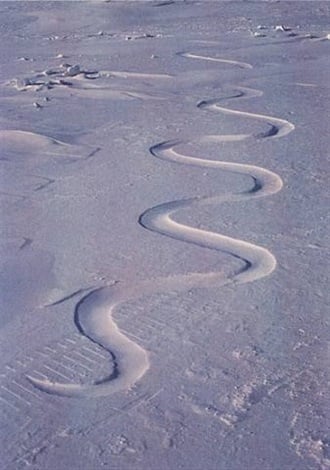
Photo: Galerie Springer
He is an artist deeply connected to his roots.

Amah-Rose Abrams

Combining a rigorous artistic practice with an intuitive love of the beauty and savagery of nature, Andy Goldsworthy’s artwork is as at home in the middle of the Arctic as it is in a London gallery. His latest show, “Leaning into the Wind,” opened at Galerie Lelong in New York on October 22, and is on view through December 5, 2015. For the occasion, let’s take a look back on the work and life of this tireless artist.
Goldsworthy grew up in Leeds, West Yorkshire in the UK, known for its rugged, feral countryside and raw weather conditions. Working on a farm from the age of 13, Goldsworthy was exposed to and at the mercy of the elements and the seasonal changes of the landscape around him. Rather than being drawn to heavy machinery like others helping out on the farm, he liked the meditative quality of repetitive manual tasks.
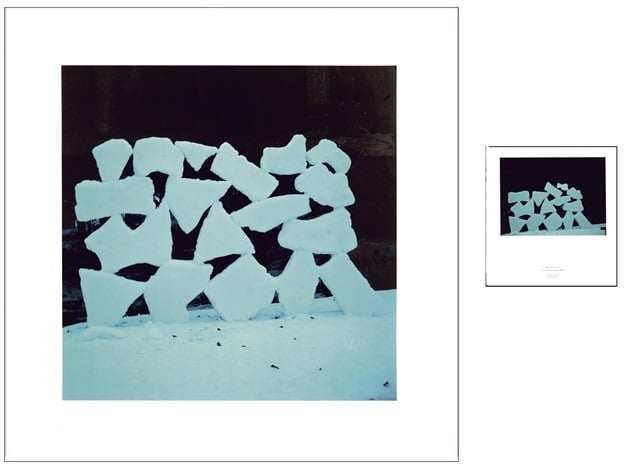
Andy Goldsworthy Slabs of frozen Snow, December 24 (1987)
Photo: courtesy Galerie Lelong
“A lot of my work is like picking potatoes,” Goldsworthy told the Guardian ahead of his retrospective at Yorkshire Sculpture Park in 2007. “You have to get into the rhythm of it. Farming is a very sculptural profession. Building haystacks or ploughing fields, burning stubble.”
Having studied fine art at the Bradford College of Art, he subsequently progressed to the University of Central Lancashire where he gained a Bachelor of Arts degree in 1978.
Unlike the monumental nature of some land art, Goldsworthy’s art is about a subtle, often modestly scaled interaction with the outdoors. The elusiveness of beauty is key to his work, which has been compared with that of Richard Long and Hamish Fulton. His art also bears a similarity to the work of Japanese architect Tadao Ando in its seamless relationship to the landscape.
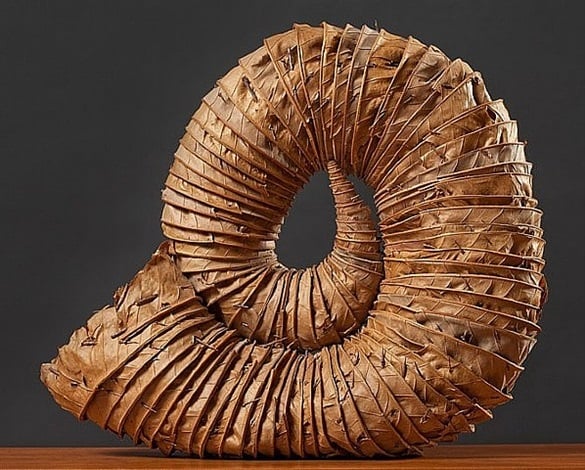
Andy Goldsworthy Title:
Leaf Horn (1996)
Photo: courtesy Leanne Hull Fine Art
“The relationship between the hand and the brain is really important,” Goldsworthy told The Herald earlier this year. “[Mathematician] Jacob Bronowski said the hand is the cutting edge of the brain. And it is. There’s a huge difference between just looking and touching. Touch feeds you. It takes you beyond just looking. Looking is important but that contact, that physical friction between hand and material is what provokes and generates sensations, feelings, ideas that are really important to making the mind work.”
A land artist in the most literal sense, Goldsworthy works with ice, water, shadows, plants, and wood. He has taken his vision all over the world, creating impermanent installations ranging from patterns drawn in snow and sand—which are extensively photographed—to delicate sculptures crafted out of leaves and water.
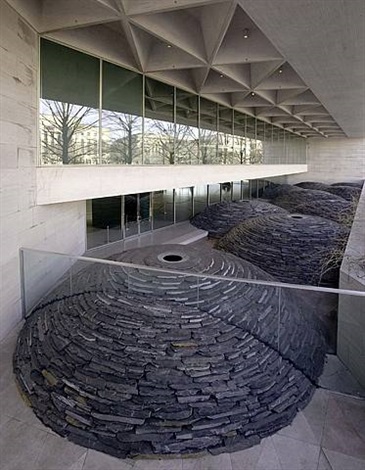
Andy Goldsworthy Roof (2005)
Photo: courtesy Galerie Lelong
Goldsworthy also works with a technique known as dry-stone-walling, which is a traditional practice of layering slate and rocks to build walls without cement. These, often larger, sculptural works are either situated in galleries or outdoors. The pieces sometimes appear to devour their surroundings, as the sculptures straddle walls and pass through windows, and tree trunks move through the man-made structures as though it had being growing there for many years.
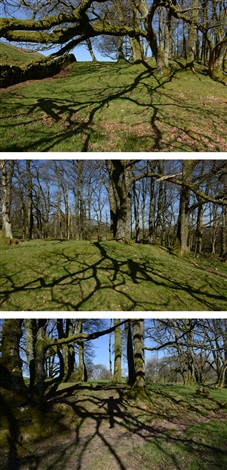
Andy Goldsworthy, Laid across oak boughs to make shadows on the ground below, Dumfriesshire, Scotland, 19 April 2014 (2014). Courtesy of Galerie Lelong.
Goldsworthy has exhibited widely. After his show at the Serpentine Gallery in 1981, he went on to exhibit extensively throughout the UK, as his relationship with nature strongly tapped into the country’s national identity. Later in the 1980s, the artist began to show in Japan, and also made large-scale works in Mexico and even the Arctic. In 1990, a touring retrospective “Hand to Earth: Andy Goldsworthy Sculpture 1976-1990” traveled to Leeds City Art Gallery, the Royal Botanic Garden in Scotland, the Stedelijke Museum in Holland, and the Centre d’Art Contemporain in Toulouse, France.
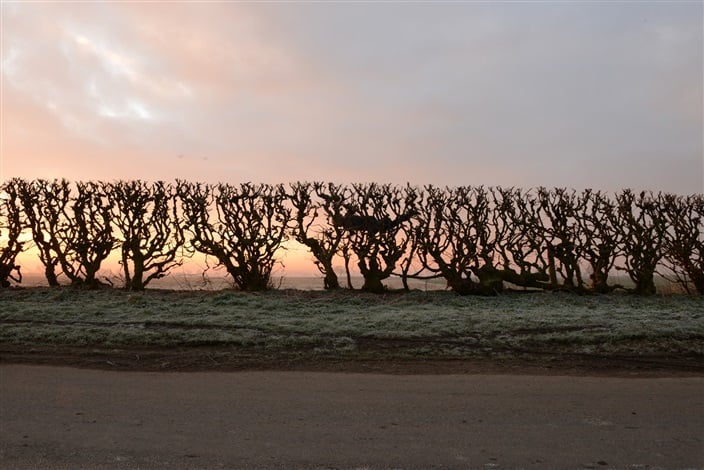
Andy Goldsworthy, Hedge crawl, dawn, frost, cold hands, Sinderby, England, 4 March 2014 (2014). Courtesy of Galerie Lelong.
Having won multiple awards throughout the 1980s, including the Northern Arts Award in both 1981 and 1982, Goldsworthy was awarded an Order of the British Empire by the Queen of England in 2000. Despite his many accolades, rather than be content with what he’s already accomplished, Goldsworthy’s work has continued to evolve. His most recent series includes photographs of landscape interventions, depicting figures leaning into strong winds in the Scottish countryside, as shadows fall though sun-drenched, carefully positioned branches.
Goldsworthy is an artist deeply connected to his roots, who manages to collaborate with the often unwilling partner of nature. As he continues to trek outdoors and face the elements in all seasons, art lovers continue to be fascinated with what he and his collaborator are able to achieve over time.
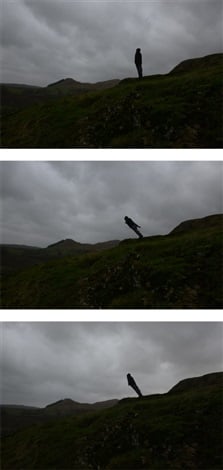
Andy Goldsworthy, Leaning into the wind, Dumfriesshire, Scotland, 15 January 2015 (2015)
Photo: Galerie Lelong
Andy Goldsworthy’s “Leaning into the Wind” is on view at Galerie Lelong, New York until December 5, 2015.